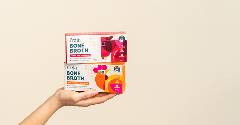News
Action on Salt: salt content of non-meat alternatives is "excessive"
24 Oct 2018The UK’s Action on Salt pressure group has exposed what it claims are excessive amounts of salt in ‘healthy’ processed meat alternatives and demand urgent action from Public Health England.

The UK’s Action on Salt pressure group has exposed what it claims are excessive amounts of salt in ‘healthy’ processed meat alternatives and demanded urgent action from Public Health England.
It says that 28% of all products surveyed are higher in salt than their maximum salt targets - due to be met by 31st December 2017, and that meat free burgers contain on average more salt than meat burgers (0.75g/serve v 0.89g/serve). 20% of products are said to have have no front of pack colour-coded labelling.This finding, it claims, reaffirms how ineffective the voluntary salt targets are due to complete lack of monitoring and guidance from Public Health England.Of the 157 supermarket meat alternative products surveyed, the highest average salt content per 100g was found in meat free bacon (2.03g/100g) and meat free sliced meat (1.56g/100g). Per portion, on average vegetarian kievs were the saltiest (1.03g) – saltier than a large portion of McDonald’s frie - followed by meat free sausages (0.96g) and, surprisingly, plain meat-free pieces and fillets (0.87g) – as salty as three portions of salted peanuts.Action on Salt last surveyed vegetarian alternatives in 2008 and while the average salt content per 100g has decreased for both meat-free sausages and meat-free burgers, it notes that the average salt content per portion of meat-free burgers has increased from 0.80g to 0.89g.Action on Salt’s survey of real beef burgers from leading retailers revealed that their average salt content per serving - 0.75g - was lower than that of meat free burgers at 0.89g per serve– saltier than a portion of salt and vinegar crisps.32 of the 154 (20%) products included in the survey had no front of pack colour-coded labelling. Disappointingly, the organisation said, only three of all products surveyed were low in salt with 0.3g per 100g or less. As Action on Salt says it has consistently shown in all product surveys, there is a large variation in the salt content of products within the same category. Most meat-free categories had at least a 50% difference in salt content between the saltiest and least salty products. Meat-free mince had the biggest variation with an 83% difference.This, the organisation said, once again highlights that it is very easy to make products with less salt and so all manufacturers should aim to reduce salt in their products, not just the responsible few.Related news

Our most-read articles of 2025
23 Dec 2025
From trade tariffs to heavy metals in protein, we look back at some of the industry’s highlights of 2025 and round up our most-read stories of the year.
Read more
Bigging up bean-based products and consumption in Britain
19 Dec 2025
Non-profit organisation the Food Foundation has launched a campaign, “Bang in Some Beans”, designed to increase UK consumers’ legume consumption.
Read more
Ingredient transparency key to success in European natural health market
12 Dec 2025
Europe’s $40.7 billion supplements market is growing fast, fuelled by demand for products that support healthy ageing, mental wellbeing, and preventive health, say experts.
Read more
Whole Foods Market forecasts fibre frenzy for 2026
11 Dec 2025
Whole Foods Market has released its top 2026 trends, predicting that a fibre frenzy will take place next year as health-conscious consumers seek out nutritious, filling options.
Read more
Sorghum emerges as better-for-you hero ingredient
9 Dec 2025
With the launch of Novak Djokovic’s sorghum-based brand, the grain’s popularity in the better-for-you snacking sphere is on the rise, thanks to its nutritional and sensory properties.
Read more
Innovation promise in 'maturing' plant-based dairy alternatives market
8 Dec 2025
Plant-based dairy is a maturing market that still faces significant hurdles around taste, functionality, nutrition, and price, but industry is innovating fast, according to experts speaking at Fi Europe.
Read more
Celebrating the winners of the Fi Europe Innovation Awards 2025
3 Dec 2025
Food industry stakeholders celebrated as the winners of the Fi Europe Innovation Awards were announced at a ceremony in Paris.
Read more
Apply now for the Vitafoods Europe Innovation Awards 2026!
28 Nov 2025
Entries for the Vitafoods Europe Innovation Awards 2026 are now open! Game-changing companies have until 27 February to submit their entry across eight categories for the chance to win big.
Read more
Concerns swirl around cinnamon’s compliance with EU law
25 Nov 2025
Cinnamon may be a top functional ingredient, but it needs stronger protocols to ensure it meets EU food safety laws and quality standards, say researchers.
Read more
Bone broth: From old-fashioned to en vogue
24 Nov 2025
OXO’s entry into bone broth has turned the spotlight on this small but high-performance category – and there is still scope for growth, especially in the area of GLP-1 support.
Read more